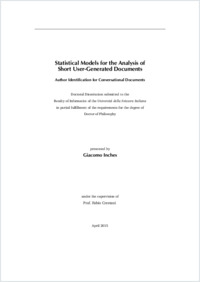Statistical models for the analysis of short user-generated documents : author identification for conversational documents
- Inches, Giacomo
- Crestani, Fabio (Degree supervisor)
-
29.01.2014
188 p
Thèse de doctorat: Università della Svizzera italiana, 2014
Short user-generated documents
Instant messaging
Chat
Forum
Blog
Online user-generated documents
Conversational documents
Authorship attribution
Authorship identification
Mrr
Information retrieval
Text mining
Burstiness
Interlocutors
English
In recent years short user-generated documents have been gaining popularity on the Internet and attention in the research communities. This kind of documents are generated by users of the various online services: platforms for instant messaging communication, for real-time status posting, for discussing and for writing reviews. Each of these services allows users to generate written texts with particular properties and which might require specific algorithms for being analysed. In this dissertation we are presenting our work which aims at analysing this kind of documents. We conducted qualitative and quantitative studies to identify the properties that might allow for characterising them. We compared the properties of these documents with the properties of standard documents employed in the literature, such as newspaper articles, and defined a set of characteristics that are distinctive of the documents generated online. We also observed two classes within the online user-generated documents: the conversational documents and those involving group discussions. We later focused on the class of conversational documents, that are short and spontaneous. We created a novel collection of real conversational documents retrieved online (e.g. Internet Relay Chat) and distributed it as part of an international competition (PAN @ CLEF'12). The competition was about author characterisation, which is one of the possible studies of authorship attribution documented in the literature. Another field of study is authorship identification, that became our main topic of research. We approached the authorship identification problem in its closed-class variant. For each problem we employed documents from the collection we released and from a collection of Twitter messages, as representative of conversational or short user-generated documents. We proved the unsuitability of standard authorship identification techniques for conversational documents and proposed novel methods capable of reaching better accuracy rates. As opposed to standard methods that worked well only for few authors, the proposed technique allowed for reaching significant results even for hundreds of users.
- Language
-
- English
- Classification
- Computer science and technology
- License
-
License undefined
- Identifiers
-
- RERO DOC 255252
- URN urn:nbn:ch:rero-006-114051
- ARK ark:/12658/srd1318463
- Persistent URL
- https://n2t.net/ark:/12658/srd1318463
Statistics
Document views: 369
File downloads:
- Texte intégral: 300
